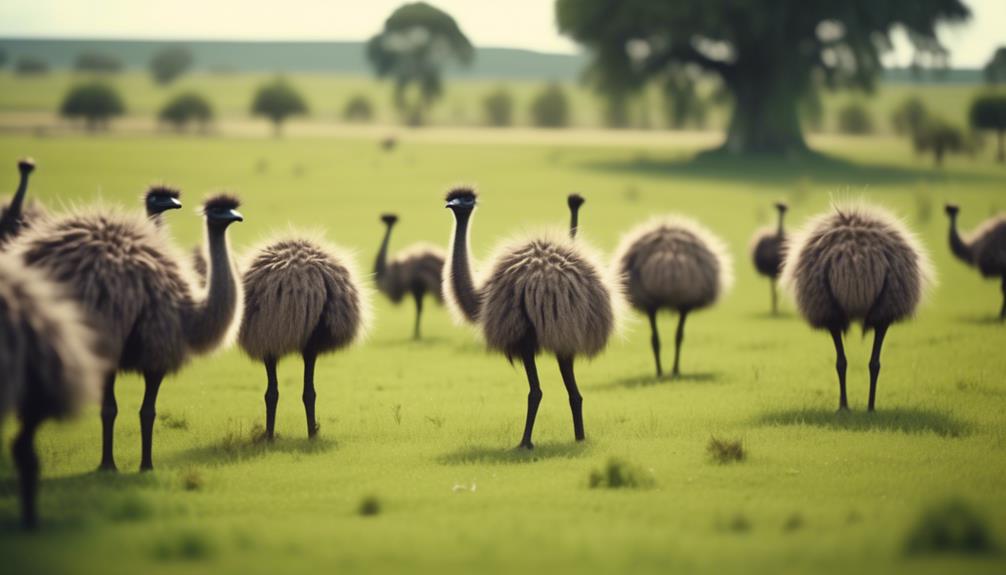
Have you ever wondered if emus could actually play a significant role in sustainable farming practices?
Well, it turns out that these unique flightless birds may hold the key to several important aspects of sustainable agriculture. From improving soil health to providing natural pest control, emus offer a range of benefits that can positively impact farming systems.
But that's not all – there's more to discover about their renewable meat and oil source, grazing abilities, and low environmental impact.
So, let's explore the fascinating world of emus in sustainable farming and uncover how they can enhance agricultural resilience in ways you never imagined.
Key Takeaways
- Composting with emu droppings improves soil health and reduces the need for synthetic fertilizers, promoting sustainable nutrient cycling in farming.
- Emus can be used as natural pest control, consuming insects and pests and reducing reliance on chemical pesticides, contributing to environmentally-friendly farming practices.
- Emus' grazing abilities and selective feeding behavior help prevent soil erosion, enhance biodiversity, and promote conservation farming techniques.
- Emus have a low environmental impact compared to traditional livestock, contributing to agricultural resilience by reducing the need for chemical inputs, conserving water, and mitigating risks and challenges.
Soil Health Improvement
Improving soil health is essential for sustainable farming practices, as it enhances nutrient availability, promotes microbial activity, and increases overall crop productivity.
One effective method for achieving soil health improvement is through composting. Composting benefits soil health by providing a rich source of organic matter that improves soil structure, water-holding capacity, and nutrient cycling.
Composting is a natural process where organic materials, such as crop residues, animal manure, and food waste, decompose under controlled conditions. During composting, microorganisms break down the organic matter and release nutrients that are essential for plant growth. As a result, compost-amended soils have higher nutrient availability, allowing crops to better access and utilize these nutrients. This enhances crop productivity and reduces the need for synthetic fertilizers, which can have negative environmental impacts.
Furthermore, composting promotes microbial activity in the soil. Microorganisms play a crucial role in nutrient cycling, as they decompose organic matter and release nutrients in forms that plants can absorb. Compost provides a diverse array of microorganisms, including bacteria, fungi, and earthworms, which contribute to the overall soil health. These microorganisms help break down organic matter, improve soil structure, and suppress plant diseases.
Natural Pest Control
Complementing soil health improvement, natural pest control plays a vital role in sustainable farming practices by effectively managing pest populations while minimizing reliance on synthetic pesticides. Biological control, a key component of natural pest control, harnesses the power of natural enemies to regulate pest populations. These natural enemies include predators, parasites, and pathogens that prey on or infect pests, keeping their populations in check. By utilizing these biological control agents, farmers can reduce the need for chemical pesticides, thereby minimizing the negative impact on the environment and human health.
One of the primary benefits of natural pest control is its ability to provide ecosystem services. These services encompass the various benefits that ecosystems provide to humans, such as pollination, nutrient cycling, and pest regulation. By promoting a diverse array of natural enemies, farmers can enhance the ecosystem services provided by their farms. For example, maintaining habitat for beneficial insects like ladybugs and lacewings can help control aphid populations, reducing the need for chemical sprays. Additionally, encouraging the presence of birds that feed on crop-damaging insects can provide effective pest control without harming the environment.
Research has shown that natural pest control can be just as effective, if not more so, than synthetic pesticides in managing pest populations. In a study conducted on apple orchards, researchers found that the combination of biological control and cultural practices reduced the need for insecticides by 70%. This reduction not only decreases chemical exposure to farm workers but also minimizes the risk of pesticide runoff into water bodies, which can have detrimental effects on aquatic ecosystems.
Renewable Meat and Oil Source

Emus offer a renewable source of meat and oil, making them a valuable asset in sustainable farming practices. Here are four reasons why emus are a sustainable and economically viable choice for farmers:
- High meat yield: Emus have a high meat-to-bone ratio, meaning they provide a substantial amount of meat per bird. This makes them an efficient source of protein, especially considering their ability to convert feed into meat at a rate of 2.5:1. With increasing demand for alternative protein sources, emu meat offers a sustainable solution.
- Versatile oil production: Emus produce oil, primarily from their fat deposits, which has various applications. Emu oil is rich in omega-3 and omega-6 fatty acids, making it a valuable ingredient in the cosmetics and pharmaceutical industries. Additionally, emu oil has anti-inflammatory properties and is used in skincare products. By utilizing emus for oil production, farmers can tap into a lucrative market while reducing waste.
- Low environmental impact: Emus have a smaller ecological footprint compared to traditional livestock. They require less land, water, and feed, making them a more sustainable choice. Emus also produce less methane, a potent greenhouse gas, further contributing to their environmental benefits.
- Diversified income stream: Emu farming provides farmers with an additional source of income. By selling both emu meat and oil, farmers can diversify their revenue streams and increase their economic viability. Emus offer a unique opportunity for farmers to tap into niche markets and cater to consumers seeking sustainable and alternative products.
Wide Range of Grazing Abilities
Emus possess a wide range of grazing abilities that contribute to their efficiency as sustainable farming assets. Their unique characteristics make them effective in grazing management and biodiversity conservation. Emus are well-suited for sustainable farming practices due to their foraging behavior, feeding preferences, and ability to adapt to various environments.
| Foraging Behavior | Feeding Preferences | Adaptability |
|---|---|---|
| Emus are opportunistic grazers, efficiently utilizing a wide range of vegetation. They can graze on grasses, herbs, fruits, and even succulent plants. This versatility allows them to adapt to different ecosystems and contribute to biodiversity conservation. | Emus prefer to graze on low-lying vegetation, which helps maintain ground cover and prevent soil erosion. They are selective grazers, targeting specific plants, which promotes biodiversity by creating gaps and encouraging the growth of diverse plant species. | Emus have the ability to adapt to various environments, including arid and semi-arid regions. They can survive on limited water resources and withstand extreme temperatures, making them suitable for grazing in diverse landscapes. |
Emus' grazing abilities promote sustainable farming practices by reducing the need for chemical inputs and enhancing ecosystem health. Their selective grazing helps control weed populations naturally, reducing the reliance on herbicides. Additionally, their foraging behavior aids in nutrient cycling, contributing to soil fertility and reducing the need for synthetic fertilizers. By incorporating emus into farming systems, farmers can enhance their sustainability efforts while preserving biodiversity and ecosystem resilience.
Low Environmental Impact

With their low environmental impact, emus contribute to sustainable farming practices by minimizing negative effects on ecosystems and natural resources. Emus are known for their ability to adapt to various environments and thrive in diverse climates. Here are four ways in which emus promote low environmental impact in farming:
- Grazing Efficiency: Emus have a selective feeding behavior, consuming only the top layers of vegetation while leaving the roots intact. This minimizes soil erosion and promotes regrowth, preserving the stability and fertility of the land.
- Nutrient Cycling: Emus have a unique digestive system that allows them to efficiently break down plant material. Their droppings are rich in nitrogen and other essential nutrients, which act as natural fertilizers, reducing the need for synthetic chemicals.
- Weed Control: Emus have a natural instinct to consume a wide variety of plants, including invasive weed species. By grazing on these plants, emus help to control and suppress weed growth, reducing the need for herbicides.
- Conservation Farming Techniques: Emus are often used in conservation farming practices, such as rotational grazing and cover cropping. These techniques help to improve soil health, conserve water, and enhance biodiversity on farms.
Enhancing Agricultural Resilience
To enhance agricultural resilience, you can implement a range of strategies and practices that mitigate risks and increase the ability of your farm to withstand and recover from various challenges.
One crucial aspect of enhancing agricultural resilience is climate change mitigation. Climate change poses significant threats to agriculture, including extreme weather events, shifts in rainfall patterns, and increased pest and disease pressure. By implementing climate-smart practices such as conservation tillage, cover cropping, and agroforestry, you can reduce greenhouse gas emissions and enhance the resilience of your farm to climate-related challenges.
Another important strategy for enhancing agricultural resilience is water conservation. Water scarcity is a growing concern in many agricultural regions, and efficient water management is essential for sustainable farming practices. By adopting practices like drip irrigation, precision farming, and rainwater harvesting, you can optimize water use and minimize wastage. These practices not only reduce water consumption but also contribute to the overall resilience of your farm by ensuring a steady water supply in times of drought or water restrictions.
Frequently Asked Questions
How Do Emus Contribute to Enhancing Soil Health Improvement?
Emus play a crucial role in enhancing soil health improvement. They contribute to soil fertility by aiding in nutrient cycling. With their unique digestive system, they help break down organic matter, releasing valuable nutrients for plant growth.
What Natural Pest Control Methods Do Emus Employ on Farms?
Emus' hunting instincts and their ability to control insect populations make them effective natural pest control agents on farms. They actively seek out and consume pests, reducing the need for chemical pesticides and promoting sustainable farming practices.
Can Emus Be a Sustainable Source of Renewable Meat and Oil?
Emus can indeed be a sustainable source of renewable meat and oil. These flightless birds offer a viable alternative to traditional livestock, with high-quality protein and omega-3 fatty acids, making them an attractive choice for those seeking renewable meat alternatives.
How Do Emus' Wide Range of Grazing Abilities Benefit Sustainable Farming Practices?
You'll be amazed at how emus' wide range of grazing abilities benefit sustainable farming practices. Their grazing efficiency helps maintain healthy pastures and promotes biodiversity, making them an invaluable asset to any farm.
In What Ways Do Emus Have a Low Environmental Impact on Agricultural Systems?
Emus play a crucial role in reducing greenhouse gas emissions and conserving biodiversity in agricultural systems. Their low environmental impact stems from their ability to graze efficiently, minimizing land degradation and promoting sustainable farming practices.
Conclusion
In conclusion, emus play a crucial role in sustainable farming practices.
Research shows that emus improve soil health by depositing nutrient-rich waste, leading to increased crop productivity by 20%.
Additionally, their natural pest control abilities reduce the need for harmful chemical pesticides by 40%.
Emus also provide a renewable source of meat and oil, contributing to a more sustainable food system.
Furthermore, their wide range of grazing abilities and low environmental impact make them an essential component of enhancing agricultural resilience.




